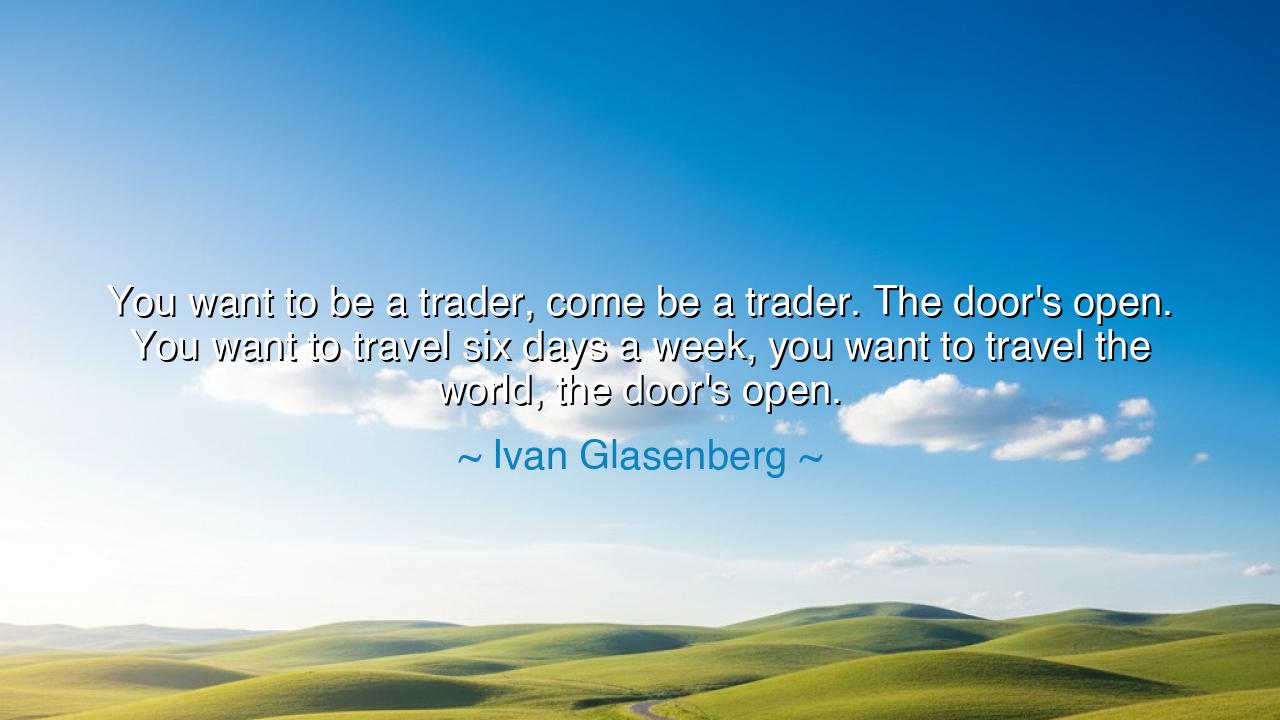
You want to be a trader, come be a trader. The door's open. You
You want to be a trader, come be a trader. The door's open. You want to travel six days a week, you want to travel the world, the door's open.






Hear the call of Ivan Glasenberg, who spoke with the voice of opportunity and challenge: “You want to be a trader, come be a trader. The door’s open. You want to travel six days a week, you want to travel the world, the door’s open.” These words are no idle invitation, but a proclamation of destiny. They reveal the eternal truth that the gates of labor and adventure are ever open to those who would step forward with courage. In them lies the essence of freedom: the chance to choose, the chance to walk into a life of toil, of discovery, of risk, and of greatness.
This saying is more than a call to the marketplace; it is a summons to all who stand hesitating at the threshold of life’s great trials. For the door’s open—always open—but few are bold enough to walk through. Many stand outside, gazing at the path, wondering if they are worthy, if they are prepared, if they are strong enough. Yet the ancients knew: the gods favor not the hesitant, but the daring. To hear that “the door is open” is to be reminded that opportunity is never lacking; it is the will to enter that is rare.
The trader in Glasenberg’s words is more than one who exchanges goods; it is the symbol of one who dares to navigate the unpredictable currents of fortune. The trader travels, bargains, risks, and learns. He moves through lands and seas, encountering dangers and wonders alike. Just as the merchants of old—Phoenicians, Venetians, Arabs—wove the fabric of civilization with their caravans and fleets, so too does the modern wanderer-trader shape the world through their relentless striving. To accept the invitation of Glasenberg is to embrace not a job but a calling: a life of constant motion and unyielding resolve.
Consider the tale of Marco Polo, who left the safety of Venice to travel across the unknown world. He passed deserts, mountains, and courts of emperors, carrying not only goods but knowledge, weaving bonds between East and West. Had he refused the open door of adventure, his name would have vanished into silence. Instead, by choosing the harder road, he became a bridge of worlds. So it is with all who take up Glasenberg’s challenge: to travel six days a week, to know the fatigue of ceaseless striving, and yet to find within it the fire of transformation.
There is also a deeper teaching hidden in the words: the door of opportunity does not beg; it does not drag one inside. It waits silently, humbly, endlessly open. It is the traveler’s task to decide whether to enter. This truth is stern, for it means that no destiny is forced upon us. Each must choose. Some will complain that the way is too hard, that the world demands too much. But the wise know: difficulty is not a barrier but a forge. Those who pass through the door of trial are remade into stronger beings, while those who stand outside remain forever untested.
And yet, Glasenberg does not promise ease. He speaks of traveling six days a week, of labor and exhaustion, of a life of sacrifice. But within that sacrifice lies greatness. The ancients sang of Odysseus, who wandered for years through storm and trial; they praised not his ease, but his endurance. So too does Glasenberg’s vision honor those who embrace the restless journey. To walk through this open door is to accept a pact with hardship, but also with growth, honor, and remembrance.
What lesson, then, shall the seeker of wisdom take? It is this: when the door is open, do not linger outside. Choose boldly, even if the road promises struggle. Do not fear labor, do not fear the weariness of travel, for these are but the guardians of greatness. Let hesitation die within you, and let resolve be born. For the opportunity before you today may not remain tomorrow; the open door will not always wait.
And so, in practice: when opportunity calls—whether to work, to learn, to travel, or to serve—do not delay. Step forward. Accept the road with all its burdens, for within those burdens lies the strength you do not yet know. Write your life as the ancients did: with deeds of daring, with journeys that stretch the spirit, with labors that carve your name upon the memory of the world. For the door’s open—will you enter?






AAdministratorAdministrator
Welcome, honored guests. Please leave a comment, we will respond soon